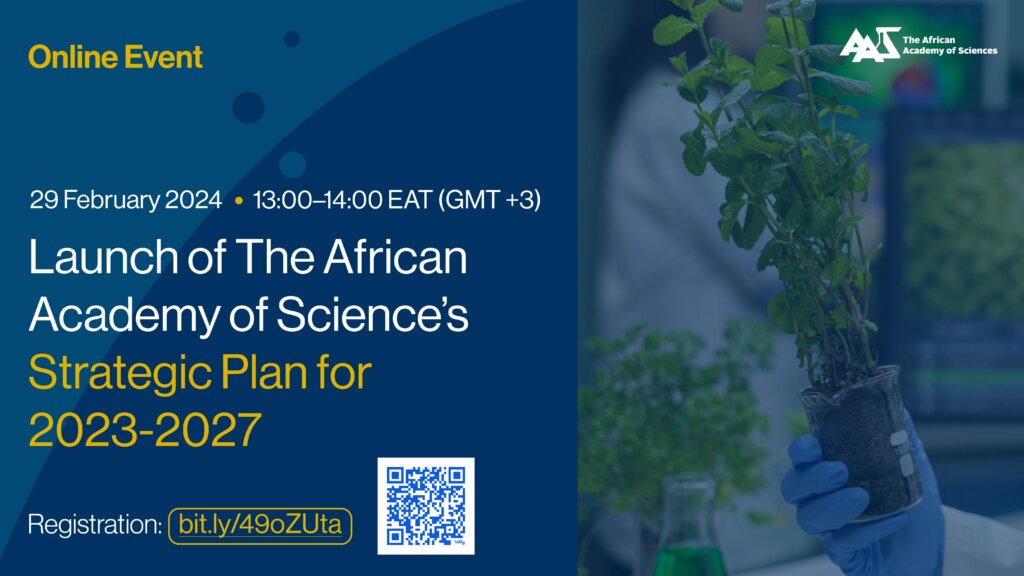With lessons learned and opportunities in science for transforming lives, the AAS Strategic Plan (2023–2027) is anchored on the vision, renewed mission, and core values of AAS. The vision is Transformed lives through science while the renewed mission is to Leverage on Science, Technology, and Innovation for sustainable development. AAS’s values that will guide the Secretariat, the Governing Council, Fellows, and Partners in implementing the mission to attain the vision are integrity, diversity, excellence, empathy, and collaboration through fairness.
The roadmap adopted by AAS in this strategic plan will be based
on five focus areas, which are summarised as follows:
1. Policy and governance
2. Natural sciences
3. Environmental and climate change
4. Health and wellbeing
5. Social sciences and humanities.
The launch was preceded by a round table on: AAS and the Advancement of Science in Africa: Policy, Practice and Prospects
- Moderator, Prof. Lise Korsten, President, AAS
- Prof. Mohamed Belhocine, Commissioner for ESTI, AU – Talk on AE
- Dr. Lidia Brito, Assistant General Director, UNESCO – Give an overview of UNESCO work in science, and the collaboration opportunities for UNESCO and AAS on advancing Agenda 2063 within the context of the Africa we want.
- Dr. Peter Gluckman, President, International Science Council –ISC and AAS partnership towards accelerating science for sustainability in Africa.
- Dr. Phil Mphati Mjwara, Director General, Department of Science and Technology, South Africa – Expound on how AAS strategy links with the implementation and operationalisation of WSF 2022 and beyond.
Further Resources
UNESCO (2023) REVIEW OF THE SCIENCE, TECHNOLOGY & INNOVATION STRATEGY FOR AFRICA (STISA-2024). FINAL REPORT (Shorter Version) #31 p.
A decade ago, the AU and the African Development Bank, based in Abidjan, Côte d’Ivoire, began work on establishing a research and innovation fund. Its scope has since been expanded to include education, and it is now called the African Education, Science, Technology and Innovation Fund. Countries were asked to contribute US$2 million each, which would be matched by the bank from its own sources. Progress has been slow. So far, only Botswana and Ghana have committed funding.
The fund’s overall size has been set at $300 million, but who else will contribute and eligibility criteria for funding applications are yet to be worked out. The fund needs to become a priority, say the authors of a review of AU science policies over the past decade, commissioned by the AU and the UN science agency UNESCO, and published at the end of 2023 (see go.nature.com/3sixqis). Ultimately, that means more heads of government will need to authorize the required finance.
A decade ago, the AU and the African Development Bank, based in Abidjan, Côte d’Ivoire, began work on establishing a research and innovation fund. Its scope has since been expanded to include education, and it is now called the African Education, Science, Technology and Innovation Fund. Countries were asked to contribute US$2 million each, which would be matched by the bank from its own sources. Progress has been slow. So far, only Botswana and Ghana have committed funding.
The fund’s overall size has been set at $300 million, but who else will contribute and eligibility criteria for funding applications are yet to be worked out. The fund needs to become a priority, say the authors of a review of AU science policies over the past decade, commissioned by the AU and the UN science agency UNESCO, and published at the end of 2023 (see go.nature.com/3sixqis). Ultimately, that means more heads of government will need to authorize the required finance.


No comments:
Post a Comment